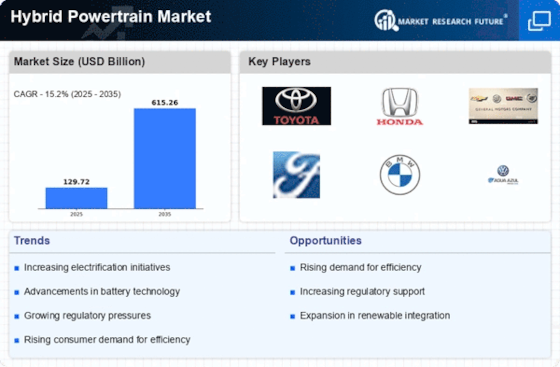Top Industry Leaders in the Hybrid Powertrain Market
*Disclaimer: List of key companies in no particular order
Top listed companies in the Hybrid Powertrain industry are:
Toyota Motor Corporation, Hyundai Motor Company, Mitsubishi Motors Corporation, Kia Corporation, Daimler AG, Nissan Motor Co. Ltd., AB Volvo, General Motors Company, Subaru Corporation, Ford Motor Company
The hybrid powertrain market is revving up, driven by soaring fuel prices, tightening emission regulations, and a growing eco-conscious consumer base. This dynamic space boasts a diverse pool of players, each vying for a larger slice of the pie. Let's dissect the competitive landscape, analyzing key player strategies, market share determinants, and emerging trends shaping the future.
Giants in the Lead: Traditional automotive titans like Toyota, Honda, and Hyundai established themselves early on as hybrid pioneers. Their experience with developing and manufacturing reliable hybrid systems gives them a head start in terms of brand recognition, established supply chains, and technical expertise. Toyota's Prius, for instance, remains a benchmark for fuel efficiency, while Honda's Accord Hybrid offers a compelling blend of performance and practicality. These established players leverage their vast resources to continuously innovate, refine existing hybrid technologies, and explore advanced variants like plug-in hybrids.
Challengers Rise: European automakers like Volkswagen Group (VW), BMW, and Volvo are aggressively pushing into the hybrid segment. VW's aggressive electrification strategy, encompassing brands like Audi and Porsche, showcases a commitment to hybrid technology. BMW's focus on performance-oriented hybrids, evident in the X5 Plug-in Hybrid, caters to a niche market seeking sustainable speed. Meanwhile, Volvo aims to become a fully electric brand by 2030, but recognizes the hybrid's role as a transitional technology, offering models like the XC60 Hybrid. These challengers bring fresh perspectives and technological advancements, potentially disrupting the established order.
New Entrants Spark Innovation: Startups and technology companies are also entering the fray, armed with disruptive ideas and agile development cycles. Tesla's Model 3 Hybrid, though currently unavailable, could shake up the market with its sleek design and advanced technologies. Companies like Rimac and Koenigsegg showcase the potential of high-performance hybrid hypercars, pushing the boundaries of what's possible. These new entrants, while currently holding smaller market shares, inject valuable innovation into the ecosystem, keeping established players on their toes.
Market Share Decider: Beyond brand recognition, several factors determine market share in the hybrid powertrain market. Fuel efficiency remains a key differentiator, with companies constantly striving to squeeze out every drop of mileage. Battery technology plays a crucial role, with longer ranges and faster charging times becoming major selling points. Additionally, price and vehicle segment catered to are vital considerations. Luxurious hybrids like the Lexus LC 500h appeal to a different segment than budget-friendly options like the Toyota Corolla Hybrid. Understanding these factors and tailoring offerings accordingly is crucial for success.
Emerging Trends Reshape the Game: The hybrid powertrain market is witnessing several exciting trends. Firstly, the focus is shifting towards plug-in hybrids (PHEVs) offering longer electric-only ranges, further reducing emissions and dependence on gasoline. Secondly, hybridization is finding its way into diverse vehicle segments, from SUVs and trucks to motorcycles and even commercial vehicles. The rise of 48-volt mild hybrids, offering fuel efficiency improvements without the complexity of full hybrids, is another noteworthy trend. Finally, collaboration is taking center stage, with partnerships between traditional automakers and technology companies accelerating innovation and market penetration.
The hybrid powertrain market promises to be a thrilling race in the coming years. Established players must balance their dominance with continued innovation and adaptation to changing consumer preferences. Challengers and new entrants need to leverage their agility and disruptive ideas to gain traction. Ultimately, the winners will be those who deliver the most compelling combination of fuel efficiency, performance, affordability, and driving experience. As the charging infrastructure expands and battery technology advances, the hybrid powertrain is poised to play a crucial role in the transition towards a cleaner and more sustainable transportation future.
Latest Company Updates:
General Motors Company:
• January 2023: Invested $918 million in four powertrain production facilities in the U.S. for hybrid and electric vehicle components. (Source: GM Insights)
Hyundai Motor Company:
• December 2023: Announced plans to invest $30 billion in battery production by 2030, with a focus on hybrid and electric vehicles. (Source: CNBC)










